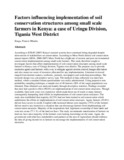| dc.description.abstract | According to ICRAF (2007) Kenya's natural systems have continued being degraded despite intervention of stakeholders on conservation. According to Meru North district soil conservation annual reports (MOA, 2000-2007) Meru North has a high rate of erosion and poor environmental conservation implementation among small scale farmers. This study therefore sought to investigate factors that affect implementation of soil conservation structures among small scale farmers in Kenya, case of Uringu division, Tigania west district.
The purpose was to provide extension agents and farmers with a way to mitigate against erosion control, hunger alleviation and also ensure no waste of resources allocated for any implementation. Literature reviewed ranged from internet sources, textbooks, journals, newspapers and workshop proceedings. The research design was a descriptive survey type. The method of data collection was interview method, where a standard format questionnaire was orally administered. Using purposive non probability sampling technique, a sample size of 48 farmers (20% of the target population) was obtained.
Data obtained was analyzed mainly through descriptive statistics. Findings revealed that men had a positive effect (90.6%) on implementation of soil conservation structures. Though available, farm tools were very expensive which made them out of reach to many farmers consequently hampering their efforts in implementation of soil conservation structures.
The study also established that majority (62.5%) had not been trained in soil conservation which undermines the efforts in implementation of soil conservation structures. Again, farmers (93.8%) did not have access to credit. Coupled with increased labour costs majority (75%) of the farmers did not receive any incentives a situation that can discourage farmers from implementing soil conservation measures.
Majority of the respondents lack legitimate ownership of their lands and were not aware (77.1 %) of the land use laws. The study recommends sensitization of farmers on land use laws since majority of the farmers were lacking knowledge on the same. Again, the government with other key stakeholders and partners in the area of Agriculture should embrace the idea of giving incentives to farmers to encourage the implementation of soil conservation measures. | en_US |

